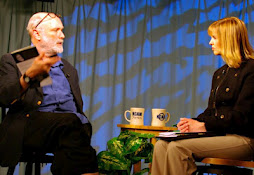
My guest Nov 4, 2008 at 5PM is Lawrence Kessenich:
"I was born in Madison, Wisconsin in 1950 -- the year it was chosen "The All-American City" by Life Magazine -- and lived in a small town for a few years, but was in Milwaukee by seven years old, so I consider it my home town. Undergrad at the University of Wisconsin-Milwaukee, took six years to get through, from 1968-1974 -- quite an era to be in college! Meandered through my twenties, and finally went to grad school in creative writing (poetry) at UMass Amherst in 1977, at 27, where I lived half-a-block from Emily Dickinson's house and encountered poets James Tate, Donald Junkins, and Joe Langland (who tried to seduce me on the banks of Quabbin Reservoir, after we drank retsina, which he hid in a tree hollow, read poetry, and went for an illegal swim in the reservoir). When I didn't get a teaching assistantship for my second semester, I had to drop out of UMass, and I applied for the Radcliffe Publishing Course, was admitted, and attended in the summer of 1978.
My first publishing job was as editorial assistant to Robie Macauley, a well-known name in the literary world, at Houghton Mifflin (pronounced ho'-tun mif'-lin, by the way -- many people don't know how to pronounce it correctly). HM's trade division was still in a brownstone on Park Street, at the time, with a manual elevator. Robie, my boss, had been a rising star writer in the 50s, went the Iowa Writers Workshop, where he dated Flannery O'Connor, and went on to edit The Kenyon Review and become the first serious fiction editor of Playboy (good stories about his time there, by the way). He came to HM as a senior editor. I had to teach myself to type faster as his assistant, because I had to type all his letters, from which I learned a lot about how to speak to writers about their work. I also shared an office with another editorial assistant right next to the office of the editor-in-chief, Austin Olney, and was in a position to see things such as John Kenneth Galbraith -- an !
enormously tall man -- duck his way under our doorways to visit Austin.
Within a year of arriving at HM, I realized that I was going to have to show that I could acquire books in order to have any chance of being promoted, so I started pursuing authors. My first two successes were W. P. Kinsella's "Shoeless Joe" (probably my best publishing story) and Rick Boyer's "Billingsgate Shoal," a mystery (which won the Edgar for Best Mystery Novel of the Year.) Both books were accepted at one editorial meeting -- which I could not attend, as an editorial assistant -- and "Shoeless Joe" won the Houghton Mifflin Literary Fellowship, so those two books made people aware of me within HM, and I was soon promoted to assistant editor, and I could start traveling to NYC to visit agents. I was ultimately promoted to editor by Nan Talese, well-known literary editor and wife of Gay Talese. I had lunch at her home in NYC a couple times, and met Gay and saw his study, with its endless rows of filing cabinets containing research documents for his many non-fiction books.!
Over my 9.5 years at HM, I acquired another HM Literary Fellowship-winning novel, "Confessions of a Taoist on Wall Street" by David Payne as well as other fiction and nonfiction books. I worked with Diane Middlebrook and Diana Hume George, the editors of "Selected Poems of Anne Sexton" and, for a few years of the nine she worked on it, with Diane on "Anne Sexton: A Biography" (there was a very controversial aspect of that book, which occurred during my watch, so you should ask me about that). I met Jimmy Carter, whose biography Nan Talese edited (one day she called me into the conference room as I passed by to show me several Carter family photo albums that Jimmy had lent her to find photos for the book). Our "slush pile" (unsolicited mss. reader), Dell Hammond, passed on Terry McMillan's first novel, "Mama," to me, and I ended up being her first editor. (There are some very good stories about her, so be sure to ask about that experience.) "Shoeless Joe" was sold to the movies!
and became the basis for "Field of Dreams." On the eve of my departure from HM, my wife and I were invited to Fenway Park to be extras in the movie, and I was very warmly received by the director and actors, who knew the whole story of my work with Kinsella. The director placed us so that we appeared onscreen, in the background, during in the movie.
I left HM because I was frustrated with the limitations of book acquisition -- how much time had to be spent "selling" books one wanted to acquire to fellow editors and sales, sub rights and publicity departments -- and I was also too much on the writers' side to be a very good contract negotiator. I left HM in June, 1988 -- the very month of the "Shoeless Joe" filming at Fenway Park.
Since then, I have made my living, first, as a technical editor, then as a technical writer, and, finally, as a marketing writer for various marketing agencies and marketing departments of companies. During that time, I have written children's books and novels for adults (had agents for some of these, but none sold), short stories, poetry, and, most recently short plays -- I just submitted two ten-minute plays for the Boston Theatre Marathon. (I have a number of stories about those years.) I've achieved the most success with my poetry, so far, having published in half-a-dozen magazines and had the one chapbook published (another is under consideration, and I've submitted a full-length ms. to a number of contests)."



